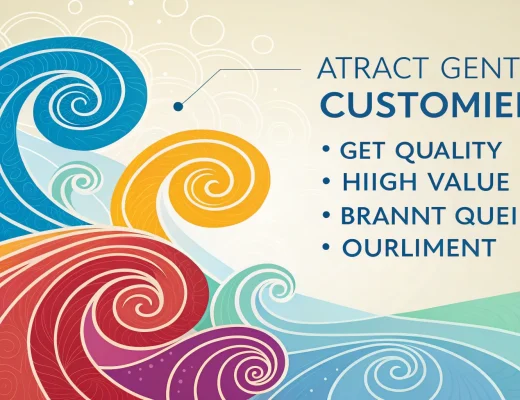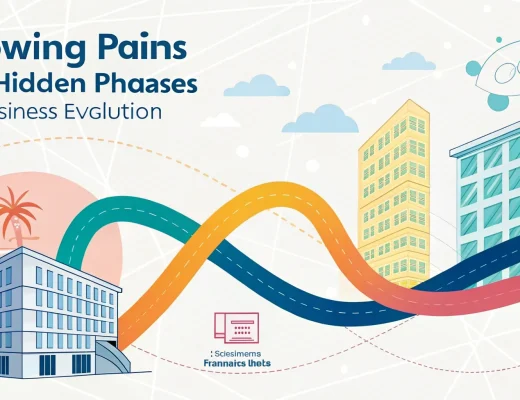In the competitive world of real estate, attracting and retaining clients is key to success. This guide will walk you through proven strategies to help you stand out and connect with potential buyers. From understanding your target market to leveraging digital marketing, these tips will give you the tools you need to grow your business.
Key Takeaways
- Understanding your target market helps you tailor your approach and meet client needs more effectively.
- Building a strong online presence, including a professional website and active social media profiles, attracts more potential clients.
- Creating an engaging and informative buyer’s guide can position you as an expert and a go-to resource in the real estate market.
- Networking and building relationships, both online and offline, are crucial for expanding your client base.
- Utilizing digital marketing strategies like email campaigns and SEO can significantly boost your visibility and lead generation.
Understanding Your Target Market

Identifying Buyer Personas
To succeed in real estate, you need to know who your customers are. This means creating detailed profiles of your ideal buyers, also known as buyer personas. Think about their age, income, lifestyle, and what they are looking for in a home. By deeply knowing your audience, you can tailor your product presentation to resonate with them. This helps you connect with them on a personal level and meet their needs more effectively.
Analyzing Local Market Trends
Staying updated on local market trends is crucial. Are certain neighborhoods becoming more popular? Are there new developments that could attract buyers? Keeping an eye on these trends helps you stay ahead of the competition and offer the best advice to your clients. This makes you not just a real estate agent, but an expert in your community.
Segmenting Your Audience
Not all buyers are the same, so it’s important to segment your audience. This means dividing your potential customers into smaller groups based on specific criteria like age, budget, or lifestyle. Understanding your target market’s demographic profiles allows you to create more targeted marketing campaigns and offer services that meet the unique needs of each group.
Building a Strong Online Presence

Creating a strong online presence is essential for success in real estate. Let’s dive into the key steps to achieve this.
Crafting an Effective Buyer’s Guide
Creating a buyer’s guide is a fantastic way to help potential clients understand the home-buying process. Let’s dive into the essential components and tips for making your guide both informative and engaging.
Essential Components of a Buyer’s Guide
A well-rounded buyer’s guide should cover several key areas:
- Local market trends and pricing: Give an overview of the current market conditions.
- Financing options: Explain different mortgage types and loan options.
- Conducting due diligence: Highlight the importance of property inspections.
- Negotiating with sellers: Offer tips on securing favorable terms.
- The closing process: Walk through the steps to finalize the purchase.
- Post-purchase considerations: Discuss moving logistics and property maintenance.
Tips for Writing Engaging Content
To keep your readers hooked, follow these tips:
- Conduct keyword research: Find out what your audience is searching for online and include those keywords in your guide.
- Include quality material: Share case studies or success stories that resonate with your readers’ dreams and challenges.
- Sprinkle in cold, hard facts: Use statistics and examples from your own experience to add credibility.
- Keep the format easily digestible: Use short sentences and paragraphs to make the content scannable.
- Add plenty of images: Break up the text with visuals to make the guide more engaging.
- Make it a downloadable PDF: Allow readers to save the guide for later.
Using Visuals to Enhance Your Guide
Visuals can make your guide more appealing and easier to understand. Consider using:
- Infographics to explain complex processes.
- Photos of well-staged homes to inspire buyers.
- Charts and graphs to present data clearly.
By putting yourself in the customers’ shoes, you can better meet their needs and improve their overall experience.
Remember, a well-crafted buyer’s guide not only educates but also builds trust and credibility with your potential clients.
Networking and Building Relationships

Networking is one of the most powerful ways to demonstrate your skills and knowledge to prospective clients. Organizing free-to-attend events like open houses or a Q&A session for first-time home buyers lets you meet potential clients face-to-face and win their business. You can develop an understanding of their wants and needs and show them how you can help them achieve their real estate goals.
Utilizing Digital Marketing Strategies

In today’s digital world, using online marketing strategies is essential for real estate success. Let’s dive into some key methods to boost your online presence and attract more clients.
Email Marketing Campaigns
Email marketing is a powerful tool to keep in touch with potential and past clients. By sending regular newsletters, you can share updates, market trends, and new listings. Consistency is key here. Make sure your emails are informative and engaging to keep your audience interested.
Pay-Per-Click Advertising
Pay-Per-Click (PPC) advertising allows you to target specific demographics and geographic areas. Platforms like Google Ads and Facebook Ads are great for this. You can create ads that showcase your listings and services, driving traffic to your website. Remember, it’s important to monitor your ad performance and adjust as needed.
Content Marketing
Content marketing involves creating valuable content to attract and engage your audience. This can include blog posts, videos, and infographics. By providing helpful information, you can establish yourself as an expert in the field. For example, you could write a blog post on "17 practical ways to integrate emerging tech into real estate marketing." This not only helps your audience but also boosts your SEO.
Digital marketing is not just about selling; it’s about building relationships and trust with your audience.
By leveraging these digital marketing strategies, you can reach a wider audience and grow your real estate business effectively.
Offering Value-Added Services
In the competitive world of real estate, offering value-added services can set you apart from the rest. These services not only enhance the client experience but also build trust and loyalty. Let’s dive into some key value-added services you can offer.
Home Staging Consultations
Home staging can make a significant difference in how quickly a property sells and at what price. By offering home staging consultations, you help clients present their homes in the best possible light. This service can include advice on furniture arrangement, color schemes, and even minor repairs. A well-staged home can attract more buyers and lead to quicker sales.
Financing and Mortgage Advice
Navigating the world of financing and mortgages can be daunting for many buyers. Providing expert advice in this area can be incredibly valuable. You can offer insights into different mortgage options, help clients understand their credit scores, and even connect them with trusted mortgage brokers. This service not only eases the buying process but also positions you as a knowledgeable and reliable advisor.
Post-Purchase Support
Your relationship with clients shouldn’t end once the sale is complete. Offering post-purchase support can leave a lasting impression and encourage future referrals. This can include providing information on home maintenance, recommending local service providers, or even organizing community events. Staying connected with clients after the purchase shows that you genuinely care about their well-being and satisfaction.
By looking beyond the immediate sale and offering these value-added services, you can unlock value and build lasting relationships with your clients.
Hosting Educational Workshops and Seminars
Topics to Cover in Workshops
When hosting workshops, it’s important to choose topics that will attract potential clients. Think about what buyers and sellers in your area need to know. For example, you could cover the current market trends, home staging tips, or financing options. Choosing the right topics can make your workshop a valuable resource for attendees.
Promoting Your Events
Promotion is key to getting people to attend your workshops. Use social media, email newsletters, and your website to spread the word. You can also partner with local businesses to co-host events and reach a wider audience. Make sure to highlight the benefits of attending your workshop to draw in more participants.
Engaging with Attendees
During the workshop, engage with your attendees by encouraging questions and discussions. This not only makes the event more interactive but also helps build a connection with potential clients. After the workshop, follow up with attendees to answer any additional questions and provide further assistance. This follow-up can turn attendees into loyal clients.
Hosting workshops and seminars is a great way to showcase your expertise and build trust with potential clients. By providing valuable information and engaging with attendees, you can create lasting relationships that benefit your real estate business.
Leveraging Testimonials and Reviews
Collecting Client Testimonials
Your happy clients are a goldmine for building trust. After a successful sale, reach out to your clients and ask for a short blurb about their experience. Make sure to get their permission to share it. Testimonials build social proof and show potential clients how well you’ve served others. Share these on your website, social media, and even in your email newsletters.
Showcasing Success Stories
Highlighting success stories can give prospects a glimpse into what working with you looks like. Share detailed stories of how you helped clients find their dream homes or sell their properties quickly. This not only builds credibility but also showcases your expertise and dedication.
Responding to Online Reviews
Engage with your online reviews, both good and bad. Thank clients for positive feedback and address any concerns raised in negative reviews. This shows that you value client feedback and are committed to improving your services. Responding to reviews can turn a negative experience into a positive one and demonstrate your professionalism.
Implementing Lead Generation Tools
Creating Effective Landing Pages
Creating effective landing pages is crucial for capturing leads. A well-designed landing page should have a clear call-to-action (CTA), engaging content, and a simple form for visitors to fill out. Make sure your landing page is mobile-friendly since many users will access it from their phones. Use compelling headlines and offer something valuable, like a free eBook or a market report, to encourage visitors to share their contact information.
Using CRM Systems
A Customer Relationship Management (CRM) system helps you organize and manage your leads. With a CRM, you can track interactions, set reminders for follow-ups, and segment your audience based on their interests. Popular CRMs like Lion Desk or Follow Up Boss can integrate with your website, making it easier to capture and nurture leads. Automated follow-ups are a key feature to look for in a CRM, as they help you stay in touch with potential clients without much effort.
Automating Follow-Up Processes
Automating your follow-up processes ensures that no lead falls through the cracks. Use your CRM to set up automated emails and SMS messages that go out at specific intervals. This keeps your leads engaged and moves them through the sales funnel. For example, you can send a welcome email immediately after they sign up, followed by a series of educational emails over the next few weeks. This not only saves you time but also builds trust with your leads.
Implementing these lead generation tools can significantly boost your ability to capture and nurture leads, making your real estate business more efficient and effective.
Staying Updated with Industry Trends
Keeping up with the latest trends in real estate is crucial for staying ahead of the competition. Here are some ways to ensure you’re always in the know.
Subscribing to Real Estate Newsletters
One of the easiest ways to stay informed is by subscribing to real estate newsletters. These newsletters often provide updates on market trends, new laws, and other important information. Staying informed helps you make better decisions and offer valuable advice to your clients.
Participating in Continuing Education
The real estate industry is always changing, so it’s important to keep learning. Attend workshops, webinars, and courses to stay updated on the latest trends and best practices. This not only enhances your skills but also shows your clients that you are committed to being the best in the field.
Following Influential Real Estate Blogs
Blogs are a great way to get in-depth information on specific topics. Follow influential real estate blogs to get expert opinions and insights. This can help you understand the market better and provide more accurate advice to your clients.
Staying updated with industry trends is not just about gaining knowledge; it’s about applying that knowledge to serve your clients better and stay ahead in the competitive real estate market.
Measuring and Analyzing Performance
Tracking Key Metrics
To understand how well your real estate strategies are working, you need to track key metrics. These metrics can include the number of leads generated, conversion rates, and customer satisfaction scores. By keeping an eye on these numbers, you can see what’s working and what needs improvement. For example, if you notice a drop in lead generation, it might be time to tweak your marketing strategies.
Using Analytics Tools
Analytics tools are essential for measuring performance. Tools like Google Analytics can help you understand your website traffic, while CRM systems can track customer interactions. These tools provide valuable insights into your business operations. For instance, you can see which marketing campaigns are driving the most traffic and which ones are falling short.
Adjusting Strategies Based on Data
Once you have gathered data from your analytics tools, it’s time to adjust your strategies. Conducting a gap analysis can help you identify areas where your performance is lacking compared to your goals. This process involves comparing your current performance to your performance expectations. By doing this, you can pinpoint specific areas that need improvement and make the necessary changes to boost your results.
Regularly reviewing your performance data ensures that you stay on track and continue to grow your real estate business.
Frequently Asked Questions
What is a buyer persona in real estate?
A buyer persona is a detailed description of a typical customer. It helps agents understand their clients’ needs and preferences.
How can I analyze local market trends?
You can study market reports, attend local real estate events, and keep an eye on property listings to understand local trends.
Why is a professional website important for real estate agents?
A professional website helps establish credibility, showcase listings, and provide valuable information to potential clients.
What are some tips for writing an engaging buyer’s guide?
Use simple language, include real-life examples, add visuals, and make sure the content is easy to read.
How can social media help in real estate?
Social media platforms allow agents to reach a larger audience, share listings, and engage with potential clients.
What are value-added services in real estate?
Value-added services include home staging consultations, financing advice, and post-purchase support to help clients through the buying process.
How do I collect client testimonials?
Ask satisfied clients to share their experiences, and make it easy for them to leave reviews on your website or social media.
Why is it important to stay updated with industry trends?
Staying updated helps you provide the best service, stay competitive, and adapt to changes in the market.







